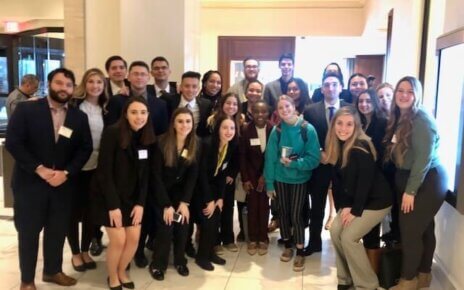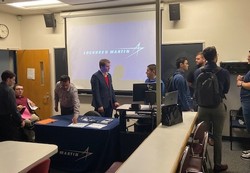The University celebrated their annual Take Back the Night campaign where students participated in a march to end violence on Wednesday, Sept. 25th.
Students gathered on the steps of Wilson Hall where a candlelit vigil was held to begin the march. The students walked throughout the campus, making numerous stops to discuss violence and sexual assault statistics and facts.
Students had different reasons for attending the march, such as athletic teams uniting together, first year students earning the letter “W” for the Shadow program, and even students who have been personally affected by violence or assault.
“Honestly, I went to Take Back the Night because my roommate wanted to go, since it was a personal matter to her,” said freshman Sarah Baker. “Also, the event addresses the major flaw of sexual assault in our society that needs to be corrected worldwide.”
John Guth, political science major, explained that he attended Take Back the Night because of the prevalent issue of violence and sexual assault. “It is important that people acknowledge this problem so that it can be resolved,” said Guth.
Take Back the Night, previously known as Reclaim the Night, was first recognized in the United States in October 1975 at a rally in Philadelphia.
Since then, it has become internationally known through groups such as the International Tribunal for Violence Against Women, which ran between 1974 and 1977 in Brussels, Belgium. National and global campaigns such as these have been at work to end violence for the past 35 years.
The New Jersey Coalition Against Sexual Assault (NJCASA), and 180 Turning Lives Around, who tabled the event and helped lead the march, are services in New Jersey that cater to victims of sexual assault or violence and are also a part of the movement to take back the night.
After stopping below the residential quad, 180 Turning Lives Around revealed some facts and statistics about violence and its victims. A specific fact was that one out of four girls and one out of six boys will experience sexual assault or violence before they turn 18.
As the march continued, the 180 Turning Lives Around representatives also announced that 73 percent of sexual assault crimes are committed by strangers, although it is still more likely that the perpetrators will be acquaintances or intimate partners. Fifty-percent of sexual assault or violence cases have occurred either at or within a mile of the victim’s home, according to the organization.
According to 180 Turning Lives Around, the effects prove to be devastating. Statistics stated that victims of sexual assault and violence are three times more likely to become depressed, three times more likely to abuse alcohol, 26 times more likely to abuse drugs, six times more likely to suffer from Posttraumatic Stress Disorder (PTSD), and three times more likely to commit suicide.
Monmouth University Police Department (MUPD) attended the event and took part in the march with the students. During a stop at Spruce Hall, Joe Hanson, University Police Officer, gave advice to the students on how to stay safe at night. He said that students should travel in pairs or groups when walking at night.
“I have been fortunate enough until this year to not know too many people who have been affected by sexual assault, but after going to Take Back the Night, I am even more passionate about the cause than I was before,” Baker said.
If you or someone you know has been a victim of sexual assault or violence, please refer to NJCASA, 180 Turning Lives Around, and other services offered in New Jersey.



